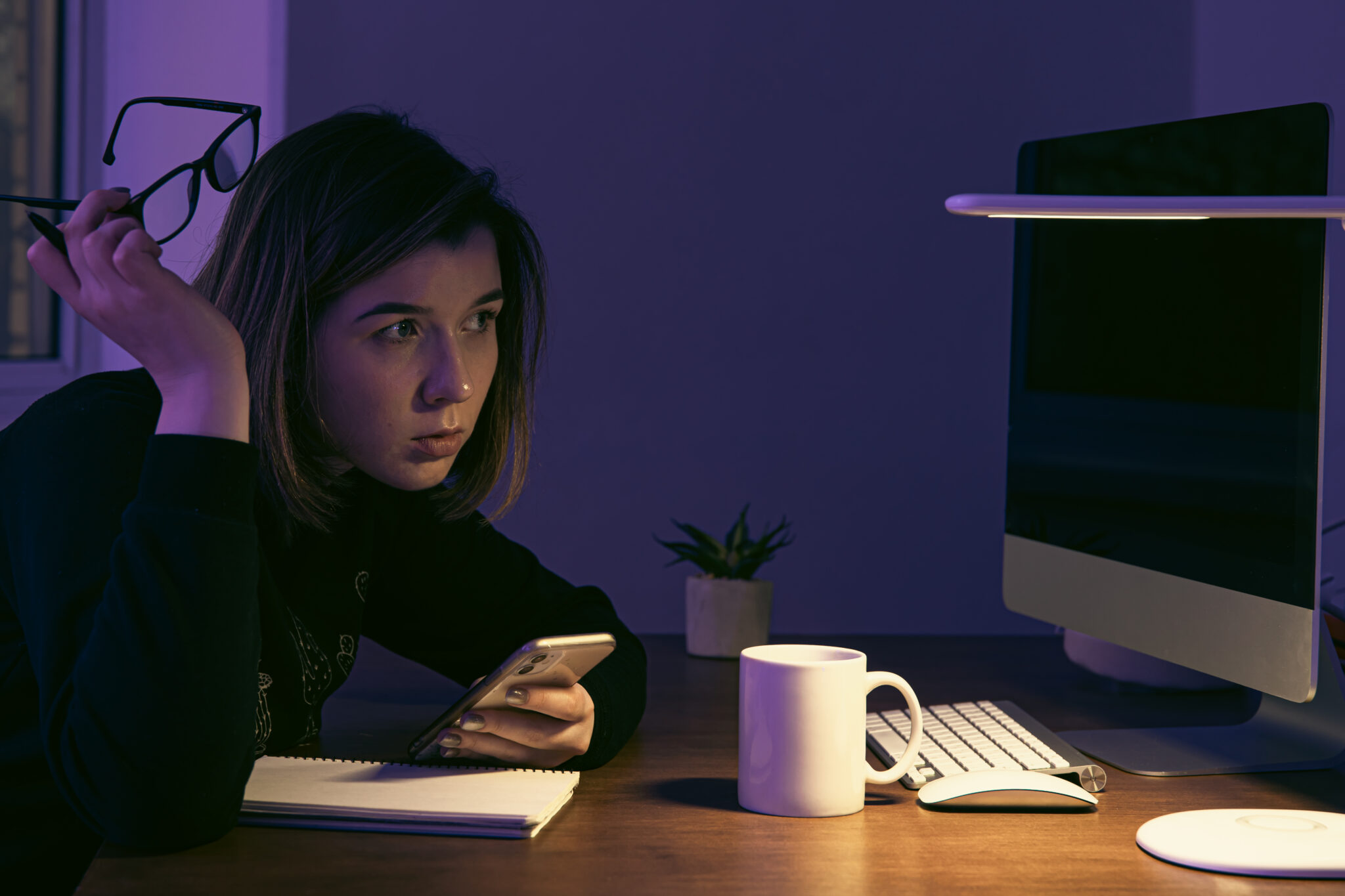With the increase in time spent on screens from phones, computers and TVs, blue light exposure has become a growing concern for skin health. Although we are familiar with the dangers of UV rays, blue light can penetrate deeper into the skin, causing premature ageing, pigmentation and other skin problems.
In this post, we will explain how blue light affects your skin and share simple, natural ways for effective blue light skin protection. Keep reading to find out how to protect your skin from digital damage and maintain a healthy glow.
Table of Contents
- 1 How Your Skin Is Affected by Blue Light and What It Is
- 2 Why Protecting Your Skin from Blue Light Is Important
- 3 Simple Methods for Blue Light Skin Protection and Prevention
- 4 Natural Methods to Protect Your Skin from Blue Light
- 5 The Final Take on Natural Blue Light Skin Protection
- 6 Frequently Asked Questions (FAQ)
How Your Skin Is Affected by Blue Light and What It Is
Computers, televisions, and cellphones all have digital screens that emit high-energy visual (HEV) light, including blue light. In contrast to UV radiation, which is primarily absorbed by the skin’s outermost layers, blue light can enter the dermis, or second layer of skin, considerably more deeply. This means it has the potential to cause long-term damage. This is why blue light skin protection is becoming increasingly important in today’s digital age.
While blue light is often associated with eye strain, it also affects your skin in a number of ways:
Premature aging: Long-term exposure to blue light can accelerate the breakdown of collagen, a protein that helps maintain skin elasticity. This can lead to wrinkles, fine lines, and an overall aged appearance over time.

Hyperpigmentation: Melanin production can be triggered by blue light, resulting in uneven skin tone or dark patches. While it can affect anyone, those with deeper skin tones may notice these changes more.
Skin Sensitivity and Irritation: Excessive blue light exposure can cause inflammation in the skin, leading to irritation, redness, and increased sensitivity. Implementing blue light skin protection strategies can help minimize these effects and maintain calm, healthy skin.
As we spend more time staring at screens, the effects of blue light exposure are becoming harder to ignore. Research suggests that the damage can add up over time, making it important to protect your skin from these digital stressors.
Why Protecting Your Skin from Blue Light Is Important
It is now crucial to protect your skin from blue light harm as our screen time increases. Here’s why it’s important:
Cumulative damage: The impacts of blue light on your skin can accumulate over time, just like UV exposure. The more time you spend in front of a screen, the greater your risk of premature aging, dark spots, and other skin problems.
Increased skin sensitivity: Blue light exposure can enhance skin sensitivity as well. If you already have sensitive skin, conditions like rosacea or eczema, blue light can worsen these problems, making the skin more reactive and causing redness or irritation.
UV protection is not enough: Although we use sunscreen to protect against UV rays, it does not protect us from blue light. Protecting against blue light requires a different approach, as it penetrates the skin deeper than UV rays.
Increased digital exposure: With remote working, increased screen use, and the growing presence of digital devices in our daily lives, protecting your skin from blue light has become as important as protecting it from the sun.
By taking measures to combat blue light exposure, you can protect your skin from long-term damage, prevent early signs of aging, and maintain healthy, glowing skin. For more detailed information on the potential risks of blue light, see this article from Harvard Health Publishing.
Simple Methods for Blue Light Skin Protection and Prevention
Protecting your skin from blue light doesn’t have to be tough. Here are some simple and effective ways to provide blue light skin protection and prevent digital damage:
Use blue light-blocking skincare products
Many skincare products now contain ingredients that specifically provide blue light skin protection. Look for serums, moisturizers, and sunscreens labelled blue light protecting. Key ingredients to look for include:
- Antioxidants like vitamin C and green tea extract can fight free radicals caused by blue light.
- Niacinamide helps with pigmentation and soothes the skin.
- Zinc oxide (in sunscreens) provides physical protection from blue light, just as it does from UV rays.
Adjust your screen settings
Change the settings on your screen to lessen the exposure to blue light for better blue light skin protection:
- Night mode: Most devices have a “night shift” or “night mode” option that reduces the amount of blue light that screens produce at night.
- Blue light filter apps: You can install apps on your phone or computer that automatically reduce blue light as the day progresses.
- Brightness control: Keep your screen’s brightness at a comfortable level to avoid eye strain and reduce blue light emissions.
Wear blue light-blocking glasses
A simple and effective way to reduce blue light exposure is to wear blue light-blocking glasses. These glasses filter out the blue light emitted by screens, helping to reduce strain on both your eyes and skin. If you spend long hours in front of a screen, this is a worthwhile investment for blue light skin protection.
Protect your skin with sunscreen
While sunscreen is typically used to protect against UV rays, it also plays a role in blocking blue light. Choose sunscreens that provide broad-spectrum protection, which shields the skin from both UV rays and HEV light. Applying sunscreen every day, even indoors, will help build a barrier against digital damage.
Take regular screen breaks
One of the greatest ways to protect your skin from the damaging effects of blue light is to minimize your exposure. Follow the 20-20-20 rule, which says that every 20 minutes, you should spend 20 seconds looking at something 20 feet away. This not only prevents exposure to blue light but also reduces eye strain and helps with blue light skin protection.
Maintain a healthy skin care routine
A well-balanced skin care routine can help strengthen your skin’s natural barrier and increase its resilience against blue light damage. Make sure to:
- Cleanse your skin regularly to remove any impurities that may cause irritation or sensitivity to your skin.
- For skin hydration and barrier repair, use hydrating products.
- To improve the penetration of active ingredients into the skin, exfoliate your skin on a regular basis to get rid of dead cells.
Natural Methods to Protect Your Skin from Blue Light

In addition to using skin care products and adjusting screen habits, natural remedies can help protect and nourish your skin from the inside out. Here are some natural ways to prevent damage to your skin from blue light:
Eat antioxidant-rich foods
Your diet plays a key role in how your skin responds to blue light exposure. Antioxidant-rich foods help fight free radicals produced by blue light, reducing inflammation and oxidative stress. Some great options include:
- Berries (strawberries, raspberries, and blueberries) are high in anthocyanins and vitamin C.
- Green leafy vegetables (spinach, kale) contain lutein, a powerful antioxidant that helps protect the skin.
- Nuts and seeds, especially almonds and sunflower seeds, which are rich in vitamin E and may help reduce skin damage caused by blue light exposure, offering blue light skin protection.
Drink green tea
Green tea is rich in antioxidants, particularly catechins, which can help protect your skin from blue light exposure. Drinking green tea regularly can help soothe inflammation, prevent premature aging, and keep your skin looking fresh. You can also apply chilled green tea bags directly to the skin for a soothing effect, contributing to your overall blue light skin protection.
Aloe vera for skin soothing
Known for its calming and healing properties, aloe vera is a great natural remedy for protecting the skin from environmental stressors, including blue light. Aloe vera helps hydrate the skin and provides a protective layer to protect it from damage. Aloe vera gel can be applied to relieve irritation and lessen redness after extended screen time.
Use essential oils
Essential oils like lavender and rosehip oil are great for their calming, anti-inflammatory, and antioxidant properties. They aid in skin regeneration and shield the skin from oxidative damage brought on by exposure to blue light. Apply a few drops of lavender oil combined with a carrier oil (such as coconut or jojoba) on your skin as part of your nightly routine.
Stay Hydrated
Proper hydration is essential for healthy, resilient skin. Drinking plenty of water throughout the day keeps your skin hydrated, which in turn helps strengthen its natural barrier against external stressors like blue light. Consider drinking cucumber or mint-infused water to refresh and hydrate your skin from the inside out.
The Final Take on Natural Blue Light Skin Protection
As our digital lives continue to grow, so does the impact of blue light on our skin. From premature aging to increased pigmentation, the effects of prolonged exposure to digital screens are real — and they can accumulate over time. But the good news is that protecting your skin from blue light damage doesn’t have to be complicated.
By incorporating simple habits like using blue light-blocking products, adjusting your screen settings, and applying natural remedies, you can protect your skin from digital stressors and maintain a healthy, youthful glow. It’s important to remember that just as you protect your skin from UV rays, blue light skin protection should be part of your daily routine.
Now that you know ways to protect your skin from blue light, it’s time to take action. Start incorporating these easy strategies into your routine today, and your skin will thank you tomorrow.
Frequently Asked Questions (FAQ)
How much screen time is too much for my skin?
There’s no specific “limit” for screen time, but prolonged exposure (4+ hours a day) can increase the risk of skin damage. Taking regular breaks and using protective skincare can minimize the effects.
Can blue light affect my skin indoors and impact blue light skin protection?
Yes, even in the absence of sunlight, the blue light that your gadgets emit can have an impact on your skin indoors. No matter where you are, it’s important to protect your skin from both UV and HEV light.
Does blue light protection in skincare products really work?
Yes, products containing ingredients such as antioxidants (vitamin C, niacinamide) and zinc oxide can help protect your skin from the harmful effects of blue light.
